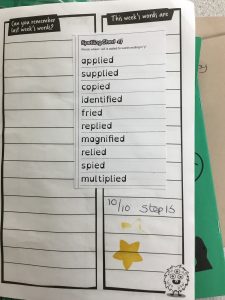At Our Lady’s, children write to be read and understood for a wide range of purposes and to communicate with a wide range of audiences. They need to be able to spell correctly so their writing can be understood. We believe the complex rules and conventions of our English spelling systems must be taught systematically.
Aims:
We aim to provide children with a wide range of spelling strategies to enable them to be confident, competent and independent spellers.
We aim to deliver the spelling objectives outlined in the EYFS Framework and National Curriculum.
We aim to provide a wide range of activities and experiences in spelling, in order to meet the learning styles of all children within the classroom.
How we teach children to spell at Our Lady’s
In EYFS, spelling is taught systematically using the Read, Write Inc (RWI) phonics approach. RWI focuses on the auditory recognition, visual recognition, blending (reading) and then segmenting (writing) of separate sounds (phonemes) in words. The phonemes and graphemes taught are divided in three sets of sounds. Through this systematic teaching of spelling, children learn that letters are used to represent different sounds, that each sound can be represented by one or more letters, that sounds may be written in more than one way and that some letters may represent more than one sound.
In Key Stage 1 and 2, our approach to spelling involves teaching the relationship between sounds and written symbols as well as using morphology to help spell through meaning.
Spellings is taught discretely and embedded within the sessions of English and other subject lessons. Spelling sessions include sessions to introduce new spelling patterns, investigate the new spelling pattern and the exceptions, practise applying the spellings to sentences, dictation and a weekly spelling test. These words are taken from the National Curriculum in line with year group expectations. Children then have 10 weekly spellings to learn based upon this. Children are provided with weekly spelling practise on Spelling Shed online learning platform at home and in school.
On a daily basis, children are encouraged to use dictionaries and word banks in class to support their spelling in independent work. If a child misspells a word that the teacher considers they should be able to spell, then they are asked to correct it.
Click here to see the school’s Spelling Progression Document
Marking of incorrect spellings in independent writing will follow the school’s marking and feedback policy (see below), encouraging the children to identify and correct any errors they have made in a piece of work. It is important that spelling is part of the drafting, editing and improving process in writing lessons. We routinely send spellings home to learn and have weekly tests throughout the school. spellings are printed in a dyslexia friendly font. Once spellings have been learned children should apply them consistently in general writing activities.
Marking and Feedback Policy – how incorrect spellings are identified and marked
Spelling Awards – Bronze, Silver and Gold
To encourage the children further, they can also aim to earn a Our Lady’s Spelling Award consisting of bronze, silver, gold.
Bronze Award = 10 weeks of correct spellings in the weekly test
Silver Award = 20 weeks of correct spellings in the weekly test
Gold Award = 30 weeks of correct spellings in the weekly test
What is Spelling Shed?
Spelling Shed is a simple, fun web-game that is playable through any internet browser on phones, tablets or computers. Each week, pupils will be assigned a spelling rule that they have been focussing on in class, pupils can also select ‘More Lists’ if they would like to revisit past assignments.
To ensure your child is given a level of challenge appropriate to them, they can choose from four levels of difficulty. The game is also designed to be dyslexic-friendly.
• Easy – The word is shown, an audio clip is played and only the included letters are shown.
• Medium – An audio clip is played and only the included letters are shown.
• Hard – An audio clip is played and the included letters, plus some random letters are shown.
• Extreme – An audio clip is played and a full qwerty keyboard is shown. Letters must be correctly accented and capitalised.
All users have an avatar that can be personalised by using honeypots. Honeypots are earned by spelling words correctly. Pupils can also keep track of how Woodingdean Primary School’s score ranks against other schools in the country, as well as how their total lines up with other pupils in our school.
How do I access Spelling Shed?
Click on the bee to access the Spelling Shed website. Alternatively, you can download the app free of charge to any tablet. Your child will have their own personal log in which they should keep safe. Please see your child’s class teacher if you need any login details this reissued.
How to get the most out of Spelling Shed
Regular spelling practise helps children to build their vocabulary and feel more confident with their writing, allowing them to write more freely and imaginatively. With your help and encouragement, your child can understand the importance of practising their spellings. Ideally, pupils should spend a short time every day using either the ‘look, cover, write, check’ sheet or accessing the games and activities available on the Spelling Shed. In addition to weekly set spellings, the more they use the program to revise previously learnt spelling patterns, the more confident they will feel in continuing to use these words in their every day writing.
 HAPPY SPELLING!
HAPPY SPELLING!

